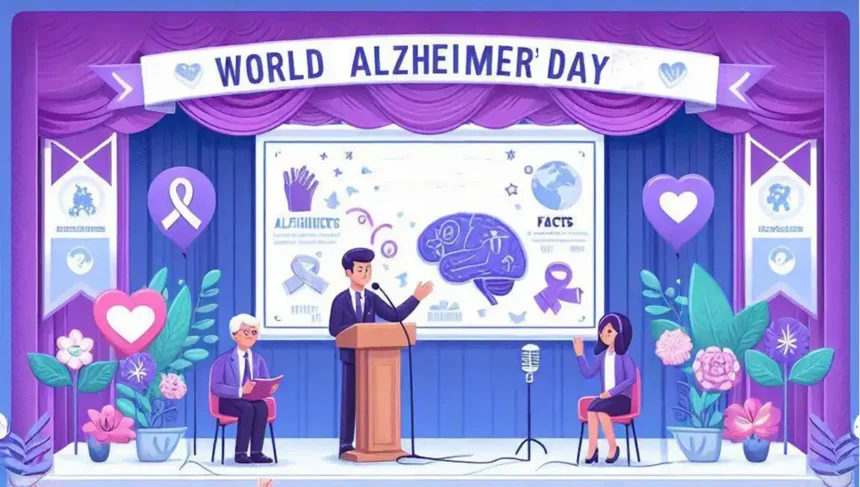Anchoring Script for World Alzheimer Day Sat, 21 Sept, 2024
Welcome Speech
Good morning to our respected Principal, teachers, staff members, parents, and dear friends. Today, we have gathered here to observe a very special occasion—World Alzheimer Day. This day is marked globally to raise awareness about Alzheimer’s disease, a condition that affects millions of people worldwide. Alzheimer’s is not just a medical condition; it impacts families, communities, and society as a whole.
I, [Your Name], am honored to be your anchor for today’s event, where we will learn more about this condition and reflect on the importance of care and support for those who suffer from it. Let us all unite in spreading knowledge, empathy, and hope for a better future for people with Alzheimer’s.
Importance of World Alzheimer Day
World Alzheimer’s Day is observed every year on the 21st of September to bring attention to this disease. Alzheimer’s is a form of dementia that gradually destroys memory and other cognitive functions. It affects older adults, though it can sometimes occur in younger individuals too. As the disease progresses, daily activities become difficult, and patients often lose their ability to remember important moments or even recognize loved ones.
It is crucial that we understand this disease not just as a medical condition, but as a challenge for families who take care of their loved ones. This day helps us spread awareness about early diagnosis, the importance of support, and finding better ways to help those affected by Alzheimer’s.
Presentation of Facts about Alzheimer’s Disease
To help us understand more about Alzheimer’s disease, we will now present some important facts.
- Alzheimer’s is the most common type of dementia, affecting more than 55 million people globally.
- There is currently no cure for Alzheimer’s, but early diagnosis and proper care can slow the progression of the disease.
- A healthy lifestyle, including physical activity and mental exercises, may reduce the risk of developing Alzheimer’s.
- Caregivers play a vital role in helping those with Alzheimer’s live more comfortable lives.
Understanding these facts helps us become more empathetic and aware of the challenges faced by both the patients and their caregivers.
Inspirational Story
Next, I would like to share an inspiring story about a person who has shown incredible courage in the face of Alzheimer’s disease. [Share a short, real-life story or a fictional account of a family who has dealt with Alzheimer’s.]
This story reminds us that while Alzheimer’s is a difficult journey, it is one that can be walked with compassion, love, and hope.
Special Performances
Now, we will have some special performances prepared by our students. The performances are dedicated to raising awareness about Alzheimer’s disease. Through dance, music, and drama, our students will highlight the importance of empathy and care for those affected by this condition.
[Insert details of the performances, such as a song, dance, or skit related to Alzheimer’s or raising awareness.]
Quiz Time
Up next, we have an exciting quiz to test our knowledge about Alzheimer’s. I encourage everyone to participate, as this will help us learn more about the disease and how we can make a difference. Here are some sample questions:
- What is the most common symptom of Alzheimer’s disease?
- Is there a cure for Alzheimer’s disease?
- How can we reduce the risk of developing Alzheimer’s?
These simple yet important questions remind us that learning about this disease is the first step in helping others.
Message of Hope
Alzheimer’s disease can seem overwhelming, but there is always hope. Medical researchers around the world are working tirelessly to find treatments and, hopefully, a cure. In the meantime, it’s our responsibility to support those living with Alzheimer’s and their families.
With love, care, and understanding, we can make a huge difference in the lives of people affected by Alzheimer’s. Let’s not forget that our small actions can bring a lot of comfort to those who need it most.
Ending Speech
As we come to the close of today’s event, I want to thank everyone for participating and showing your support for this important cause. Let’s remember that awareness and understanding are the keys to making the world a better place for those with Alzheimer’s disease.
I encourage all of you to continue learning about Alzheimer’s and finding ways to contribute, whether it’s through spreading awareness, supporting caregivers, or simply being compassionate to those affected.
Before we end, I would like to leave you with this thought: “In a world where memory fades, let us be the light that shines through the darkness of Alzheimer’s.”
Thank you, everyone, for your time and attention. Let’s make every day an opportunity to create awareness and help those who need it.
Conclusion
In conclusion, World Alzheimer’s Day is more than just a day of awareness; it’s a day for action, understanding, and support. Let’s continue to stand by those who suffer from Alzheimer’s and their families, offering them the compassion and care they deserve.
Once again, thank you all for being a part of this important event, and let’s pledge to make a difference, no matter how small it may seem. With unity and love, we can overcome the challenges posed by Alzheimer’s disease.
Goodbye and Thank You
With this, we come to the end of our program. I hope today’s event has helped you learn more about Alzheimer’s and the impact it has on individuals and families. Let us all continue to spread awareness and offer support to those in need.
Thank you, and have a wonderful day ahead!









